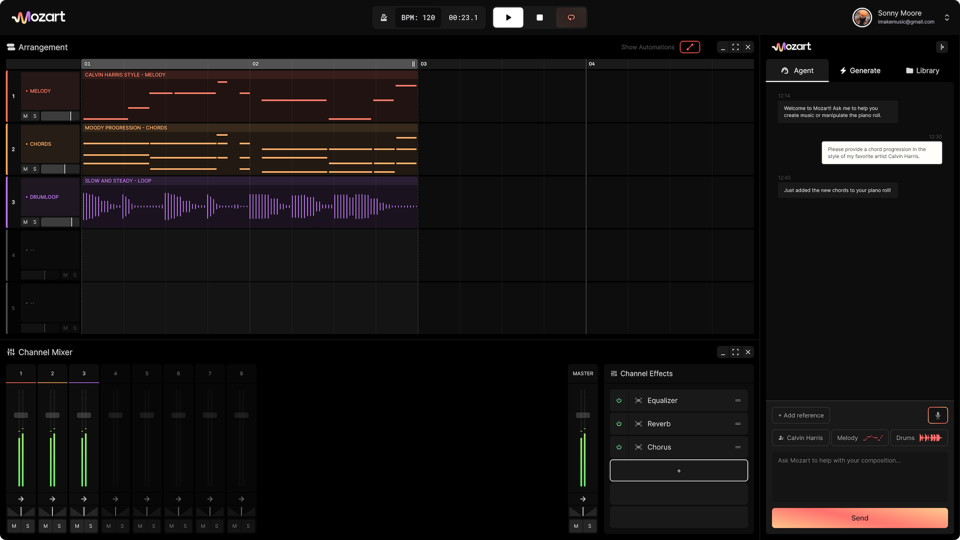A London startup called Mozart AI is launching today with $730,000 in pre-seed funding and a challenge to the current wave of generative music platforms. While companies like Suno and Udio promise to turn text prompts into finished pop songs in seconds, Mozart takes a very different approach: it wants to speed up the way artists already work, without taking the artist out of the process.
Mozart AI’s founding team sees this as an opening. “We’re trying to eliminate friction, not creativity,” said co-founder and CEO Sundar Arvind, a former professional tennis player and teenage music prodigy who was signed to Warner Bros.’ Spinnin’ Records by the age of 14. “Making music is supposed to be fun. Our tools are built by musicians who understand that. The last thing producers want is a one-click song.”
Mozart’s product is a full digital audio workstation (DAW) powered by natural language controls and real-time AI suggestions. It doesn’t spit out completed tracks. Instead, it helps artists build songs step by step, generating ideas for chord progressions, melodies, samples, and drum kits, all guided by the user’s creative direction. Want to EQ the lows out of an 8-bar euphoric loop? Just ask. Want to find that Beatles-style guitar riff buried somewhere in your own sample library? Mozart will search by vibe.
Behind the scenes, the software manages the messy engineering: quantization, audio effects, sound design, and routing. But unlike Suno or Udio, the user remains in control. “You’re still producing. You’re just producing with a co-pilot,” Arvind said. He gave me a demo of the system and it’s impressive. As an amateur musician, with a lifetime of bad guitar playing under my belt, I could write a fully produced original song with this bespoke AI system. It will be interesting to see if non-musicians can utilize it the same way.
Max Sarre, an independent music producer who has over 1m streams and 50k monthly listeners, added: “WOW I’m still struck that this is real. I’ve produced for the longest time without AI, but this (Mozart) felt empowering. The speed of suggestions and iterations is insane, feels like I’m working with a AI replica of myself!”
Arvind says his company will never train on copyrighted music and never generate full songs. “We want to help artists finish more of what they start,” Arvind said. “Eighty-five percent of music today never gets released. We’re changing that by speeding up what artists already do, not replacing them with generic AI clones.”
Mozart AI has been in private beta since June with over 25,000 users on the waitlist. The public release is scheduled for July 16. Investors in the round include EWOR, New Renaissance Ventures, Stefan Glaenzer (last.fm), and Atlantis Ventures.
“Just 10 days after joining EWOR, Sundar, Arjun, and the team had built a first version of product. They move at light speed, and I’m excited to see how they change the way music is made.” added Daniel Dippold, Founder & CEO at EWOR.
The AI co-production platform is aimed at independent artists and professionals who want faster workflows without sacrificing creative control.
Danny White, an LA-based producer who has collaborated with legendary artists like Tiesto, said “I was very impressed by how I could just use text prompts to perform simple tasks in an instant that would normally be tedious. I was also able to easily create chords that evoked specific feelings that I want to convey. This is the next big leap in music production, and I’m excited for its future.”
This isn’t Arvind’s first time building with AI. Alongside co-founder Arjun Khanna, he previously launched Blitzo, an AI-driven last-mile delivery startup with £1.3 million in ARR. Khanna has won some of India’s most prestigious math competitions and has represented India for professional debates at Harvard. The Mozart founding team also includes professional bassist Immanuel Rajadurai, who brings experience from both Big Tech and AI research, and Pascual Merita Torres, a University of Edinburgh-trained AI researcher who has been producing music professionally for over a decade.
Their pitch is clear: fight AI with AI, but make sure the human is in charge. “Suno starts with a song and lets you edit it after,” Arvind said. “We start where music actually begins — with the artist’s idea. You build from the bottom up, not the top down.”
“Still feels unreal, I’ve avoided AI in my production for years, but Mozart felt empowering. s,,” said London producer and songwriter Max Sarre, who tested the beta version in June. “It doesn’t get in the way. It just saves me time with every workflow.”
Mozart AI will operate as a subscription-based service. Pricing has not yet been disclosed, but the company says it will offer early access to select beta users ahead of its official launch on the 16th of July.

